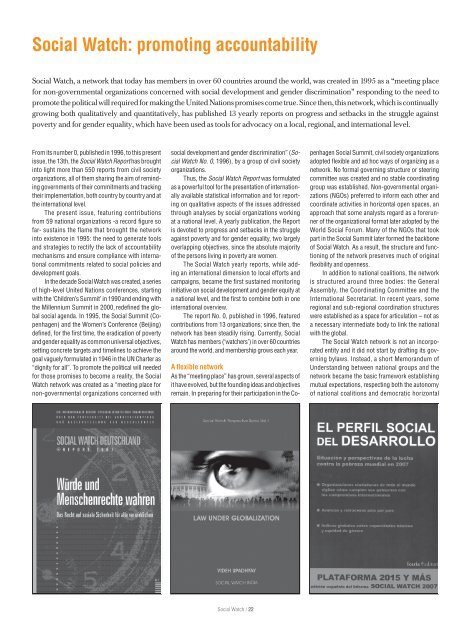R E P O R T 2 0 0 8 - Social Watch
R E P O R T 2 0 0 8 - Social Watch
R E P O R T 2 0 0 8 - Social Watch
You also want an ePaper? Increase the reach of your titles
YUMPU automatically turns print PDFs into web optimized ePapers that Google loves.
social watch: promoting accountability<br />
<strong>Social</strong> <strong>Watch</strong>, a network that today has members in over 60 countries around the world, was created in 1995 as a “meeting place<br />
for non-governmental organizations concerned with social development and gender discrimination” responding to the need to<br />
promote the political will required for making the United Nations promises come true. Since then, this network, which is continually<br />
growing both qualitatively and quantitatively, has published 13 yearly reports on progress and setbacks in the struggle against<br />
poverty and for gender equality, which have been used as tools for advocacy on a local, regional, and international level.<br />
From its number 0, published in 1996, to this present<br />
issue, the 13th, the <strong>Social</strong> <strong>Watch</strong> Report has brought<br />
into light more than 550 reports from civil society<br />
organizations, all of them sharing the aim of reminding<br />
governments of their commitments and tracking<br />
their implementation, both country by country and at<br />
the international level.<br />
The present issue, featuring contributions<br />
from 59 national organizations -a record fi gure so<br />
far- sustains the flame that brought the network<br />
into existence in 1995: the need to generate tools<br />
and strategies to rectify the lack of accountability<br />
mechanisms and ensure compliance with international<br />
commitments related to social policies and<br />
development goals.<br />
In the decade <strong>Social</strong> <strong>Watch</strong> was created, a series<br />
of high-level United Nations conferences, starting<br />
with the ‘Children’s Summit’ in 1990 and ending with<br />
the Millennium Summit in 2000, redefi ned the global<br />
social agenda. In 1995, the <strong>Social</strong> Summit (Copenhagen)<br />
and the Women’s Conference (Beijing)<br />
defined, for the first time, the eradication of poverty<br />
and gender equality as common universal objectives,<br />
setting concrete targets and timelines to achieve the<br />
goal vaguely formulated in 1946 in the UN Charter as<br />
“dignity for all”. To promote the political will needed<br />
for those promises to become a reality, the <strong>Social</strong><br />
<strong>Watch</strong> network was created as a “meeting place for<br />
non-governmental organizations concerned with<br />
social development and gender discrimination” (<strong>Social</strong><br />
<strong>Watch</strong> No. 0, 1996), by a group of civil society<br />
organizations.<br />
Thus, the <strong>Social</strong> <strong>Watch</strong> Report was formulated<br />
as a powerful tool for the presentation of internationally<br />
available statistical information and for reporting<br />
on qualitative aspects of the issues addressed<br />
through analyses by social organizations working<br />
at a national level. A yearly publication, the Report<br />
is devoted to progress and setbacks in the struggle<br />
against poverty and for gender equality, two largely<br />
overlapping objectives, since the absolute majority<br />
of the persons living in poverty are women.<br />
The <strong>Social</strong> <strong>Watch</strong> yearly reports, while adding<br />
an international dimension to local efforts and<br />
campaigns, became the fi rst sustained monitoring<br />
initiative on social development and gender equity at<br />
a national level, and the first to combine both in one<br />
international overview.<br />
The report No. 0, published in 1996, featured<br />
contributions from 13 organizations; since then, the<br />
network has been steadily rising. Currently, <strong>Social</strong><br />
<strong>Watch</strong> has members (‘watchers’) in over 60 countries<br />
around the world, and membership grows each year.<br />
A flexible network<br />
As the “meeting place” has grown, several aspects of<br />
it have evolved, but the founding ideas and objectives<br />
remain. In preparing for their participation in the Copenhagen<br />
<strong>Social</strong> Summit, civil society organizations<br />
adopted flexible and ad hoc ways of organizing as a<br />
network. No formal governing structure or steering<br />
committee was created and no stable coordinating<br />
group was established. Non-governmental organizations<br />
(NGOs) preferred to inform each other and<br />
coordinate activities in horizontal open spaces, an<br />
approach that some analysts regard as a forerunner<br />
of the organizational format later adopted by the<br />
World <strong>Social</strong> Forum. Many of the NGOs that took<br />
part in the <strong>Social</strong> Summit later formed the backbone<br />
of <strong>Social</strong> <strong>Watch</strong>. As a result, the structure and functioning<br />
of the network preserves much of original<br />
flexibility and openness.<br />
In addition to national coalitions, the network<br />
is structured around three bodies: the General<br />
Assembly, the Coordinating Committee and the<br />
International Secretariat. In recent years, some<br />
regional and sub-regional coordination structures<br />
were established as a space for articulation – not as<br />
a necessary intermediate body to link the national<br />
with the global.<br />
The <strong>Social</strong> <strong>Watch</strong> network is not an incorporated<br />
entity and it did not start by drafting its governing<br />
bylaws. Instead, a short Memorandum of<br />
Understanding between national groups and the<br />
network became the basic framework establishing<br />
mutual expectations, respecting both the autonomy<br />
of national coalitions and democratic horizontal<br />
<strong>Social</strong> <strong>Watch</strong> / 22<br />
Iibrillo ing 2008 24 pp.indd 22 06.11.2008 14:46:00

















